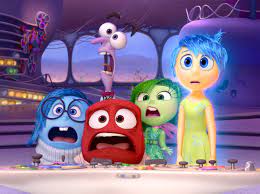
Disney isn’t necessarily the first place we look when wanting to understand our emotional world.
But in Inside Out, there’s something brilliant and, in my experience, incredibly helpful that we can take from it.
Let me explain
Inside Out introduces us, very subtly, to the psychological concept of ‘parts’ (otherwise known as Internal Family Systems). It’s the idea that we have differing emotions inside us, that all have a role to fulfil, but which can often seem to be in conflict.
How often have you found yourself saying “part of me wants x/y/z but another part of me …….”?
I know I have.
The film beautifully illustrates this through the five parts that exist within the main character of Riley; Anger, Disgust, Joy, Fear and Sadness. At various points in the story, these parts try to take charge. They all believe that the action they want to take is the right one at that moment in time, but don’t necessarily anticipate what the consequences might be.
More about Internal Family Systems
You might already be aware of some of your parts.
You may have a ‘social butterfly’ that loves to host a party, chatting and meeting people, but you might also have a ‘perfectionist’ part. This part spends several hours beforehand worrying about the food, what you’ll wear, whether people will have a good time and what they’ll think about you. Sometimes coping with the different aspects of these parts can feel pretty exhausting!
You might even have different relationships with these parts. Perhaps some feel useful and helpful and others seem like they actively get in the way of what you want.
But there’s a lovely saying in IFS, that there are no ‘bad’ parts in our emotional world. Even that perfectionist part, which might sometimes feel as though it gets in the way of you being able to relax and switch off, has a purpose and a function that, if we take time to really understand it, makes sense.
Stepping back and becoming an observer of our parts can really help us to feel more compassionate towards or appreciate of, them.
Perhaps your perfectionist part simply wants to make sure that you have a good time with your friends because it holds a memory of how hard it was to make friends when you moved around a lot as a child.
Maybe the part of you that gets angry is trying to ensure that nobody takes advantage of you the way that school bullies used to.
Here’s another really helpful explanation of it.
Bringing the parts of your emotional world together
Just like in Inside Out, there can be times in our emotional worlds when parts can really be in conflict with one another. This is because they all believe their way is the best way!
Take time to notice when a part is really desperately trying to take charge and consider what its function is. This can help you to find compassion for yourself (rather than frustration). Turning your attention towards onto a part can shine light onto what you might actually be scared of, or needing, in any given moment or situation.
Consider that perfectionist part – maybe it’s really scared that if you don’t do everything ‘right’ that the friends you’ve got in your life now, might not stick around and you’ll find yourself having to start all over again. When working through an IFS lens your therapist will encourage you not to judge it, but to let it know that you get it. You understand and appreciate its worries.
Then you can begin to address those underlying worries and fears and think about what might help it to step back a little – to let it know that it doesn’t need to work quite so hard because you’ve got this!
Remember – all parts have a function and role to play. IFS helps us to identify, get to know and understand them so that they can heal from the fears they’re holding and work in harmony with us.

Leave a Reply